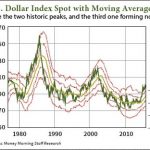What is economic growth? This isn’t an easy question to answer. Most people might respond with a reference to GDP. That wouldn’t necessarily be an incorrect one, but it may not be exactly on point, either. GDP was developed in order to try and assess economic growth, and over the years has simply become a stand-in for it.
That’s true of many economic statistics. If the numbers are positive, without further contemplation we take that as growth. All these figures and estimates were developed with those same assumptions – that if a broad survey of them all kept up positive numbers that would be consistent with growth. GDP was intended to capture the widest possible view.
This is one of the biggest problems over the last eleven years. You didn’t have to argue with people about late 2008 and early 2009 – everyone knew what the economy was doing. The fact that GDP or another statistic like Industrial Production was collapsing (didn’t matter in which country) simply matched perceptions.
We’ve whittled down these accounts to these small changes. In the grand scheme of things, even the contraction in 2008 and 2009 was a small thing; or it should have been. Recessions, even “great” ones, are painful only in the present tense. There are supposed to be quickly forgotten, the negatives all go positive and away we go.
Economic growth, then, is consistency. Sure, the economy may stumble into recession, that’s only natural. But if it only grows occasionally here and there, that’s worse than a recession. Positive numbers aren’t necessarily consistent with economic growth, and those who designed the statistics never envisioned that there could be something other than robust growth or temporary contraction.
This sad case has been pioneered in Japan, spreading and infected the whole global system. The numbers, at times, look good even over there. And when they do, the Japanese people hear about it endlessly from the government and the government’s Economists. When they don’t look good, officials change tense and talk about the future. Back and forth they all go.









Leave A Comment